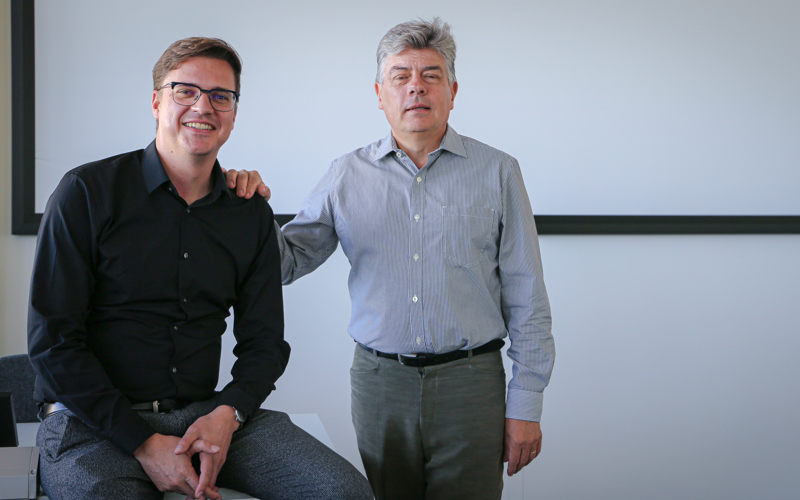08 Nov 2022
Philippe Régnier and Pascal Wild, professors at the School of Management Fribourg, have published a book on the topical issue of innovation and appropriate technologies. As the supervisors and co-editors of this international study, Mssrs Régnier and Wild worked with specialists from institutions at the forefront of scientific and applied research, from the MIT D-Lab in Boston (USA), Polytechnique Montreal (CA), and the Indian Institute of Technology-Madras (India).

Initiated in 2021, publication by the prestigious House of Edward Elgar Publishing of The Handbook of Innovation & Appropriate Technologies for International Development could not come at a more opportune moment. In the fall of 2022, when energy resources are being used with increasing care, appropriate technologies that focus on innovation reduced to the essential provide alternative, low-impact solutions to today's sustainable development challenges.
Having worked for many years on the subject of appropriate technologies in developing and emerging countries, Philippe Régnier and Pascal Wild, professors at the School of Management Fribourg (HEG-FR), co-edited this publication, working with scientists from the D-Lab of the Massachusets Institute of Technology - MIT (United States), Polytechnique Montreal (Canada), and the Indian Institute of Technology-Madras (India). This panel of experts then recruited high-profile contributors to enable a discussion and an empirical examination of new forms of disruptive innovation capable of producing a wide range of appropriate technologies useful for both industrialized and less advanced countries.
From generic drugs to portable computers
Within a global context of a disciplined and sensible use of natural resources, appropriate technologies are proving to be extremely timely : they are enhancing knowledge in science and technology, allowing concrete applications close to the field, and contributing to sustainable development.
Moreover, these appropriate technologies are more efficient than traditional technologies. They are also less costly in terms of resources and less sophisticated than cutting-edge technologies. As a result, they are more accessible and thus able to respond to society`s less privileged segments around the world.
Examples include the globalized production of generic drugs, simple solar panels, low-cost laptops, small vehicles, and low-cost modes of communication. These technologies are called appropriate because of their ability to meet the basic needs of populations and to adapt to local conditions. They are easy to use, maintain, repair and replicate on various scales.
An economy of sobriety
Appropriate technologies are the subject of development strategies launched, notably, in India since decolonization and then adopted and expanded on a global scale by world-class engineering schools, such as MIT (USA). They contribute to numerous public-private partnerships and to various international cooperation actions in order to allow populations to access better working and living conditions. Thanks to economists, but also philosophers - from Gandhi to Ernst F. Schumacher - and even major religious movements, such as Buddhism and the Buddhist economy known as sobriety, these technologies enjoy a high profile, both conceptually and in terms of practical applications.
Since the beginning of the 21st century, various innovations in the field of digitalization have allowed these technologies to multiply in agriculture, manufacturing and services and have brought populations closer to the basic services deemed essential for their well-being and a more sustainable development.
Co-published by the HEG-FR, MIT (USA), Polytechnique Montréal (Canada), and the Indian Institute of Technology-Madras (India), this book is brought to the public`s attention by the University of Applied Sciences Western Switzerland`s (HES-SO) 2021-24 scientific research program on appropriate technologies and sustainable development. Collaboration was close with the State Secretariat for Education, Research and Innovation (SEFRI) and, in particular, its global, scientific, and technological cooperation network, Swissnex.
Swiss co-editors and authors
Philippe Régnier is a professor and Dean of Research at the University of Applied Sciences Fribourg (HEG-FR). He specializes in entrepreneurship, the private sector, and development in emerging countries. He has conducted extensive field research in Asia and Africa. Before joining the HEG-FR, he taught at the Graduate Institute of International and Development Studies, Geneva (Switzerland) and at the University of Ottawa (Canada). His current research focuses on the internationalization of small and medium-sized western enterprises to emerging markets, as well as the entrepreneurial ecosystems of global cities facilitating the interconnection and globalization of national economies.
Order online (EE Publishing)Contacts

Philippe Regnier
Full Professor UAS
+41 26 429 63 97

Pascal Wild
Director and Dean
+41 26 429 63 52